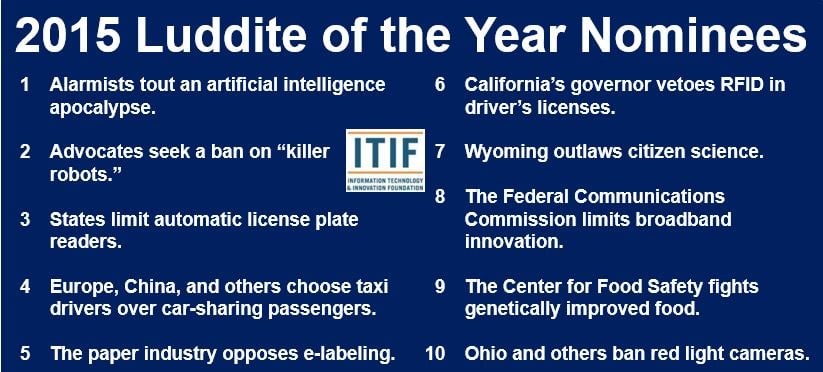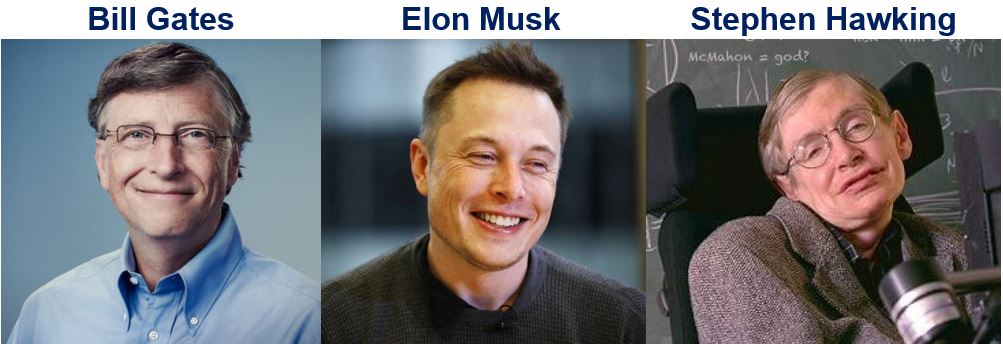Elon Musk, CEO of private space transport firm SpaceX and electric automaker Tesla, and Stephen Hawking, a theoretical physicist, cosmologist, author and Director of Research at the Centre for Theoretical Cosmology within the University of Cambridge, have been nominated for the title of Luddite of the Year. Founder of Microsoft Corporation, Bill Gates, has also been nominated.
They have been put forward because of fears they have expressed over the past year regarding the future potential dangers of Artificial intelligence.
Professor Hawking once said “The development of full artificial intelligence could spell the end of the human race.”
The Luddites were 19th century British textile workers who protested against new labour-saving technologies, such as power looms, spinning frames and stocking frames that were introduced during the industrial revolution.
 ITIF writes “For 2015, we present 10 nominees and invite readers to vote for the organization or individual they believe has done the most to smash the engines of innovation.” (Image Data From: itif.org/publications)
ITIF writes “For 2015, we present 10 nominees and invite readers to vote for the organization or individual they believe has done the most to smash the engines of innovation.” (Image Data From: itif.org/publications)
The Luddites feared these new machines would replace them with less-skilled, poorly-paid labourers, leaving them out of work.
The Luddite Movement became quite vicious and culminated in a region-wide rebellion in Northwestern England that required a considerable deployment of military forces to suppress. Today, a Luddite refers to a person who is opposed to new technology.
The fear that artificial intelligence could mean end of humanity
According to ITIF (Information Technology & Innovation Foundation), the organisers of the current annual Luddite Award, over the past year several prominent scientists and well-known luminaries, such as Elon Musk, Stephen Hawking and Bill Gates, have expressed fears that in the not-so-distant future we could lose control of AI (artificial intelligence), thus creating an existential threat.
For over 200 years, paranoia about evil machines has thrived in popular culture “and these claims continue to grip the popular imagination, in no small part because these apocalyptic ideas are widely represented in books, movies, and music,” ITIF writes in a report.
In 2014 alone, people watched several blockbuster movies with a parade of high-tech villains, such as Ex Machina, Terminator: Genisys, and Avengers: Age of Ultron.
Neo-Luddites oppose tech and science advances
ITIF says it gives the award to people who wish to ‘foil technological progress’ by opposing advances in tech and science.
While today’s Luddite no longer wields a sledgehammer, he or she wields something considerably more powerful – bad ideas “For they work to convince policymakers and the public that innovation is the cause, not the solution to some of our biggest social and economic challenges, and therefore something to be thwarted.”
“Indeed, the neo-Luddites have wide-ranging targets, including everything from genetically modified organisms to new Internet apps, artificial intelligence, and even productivity itself. In short, they seek a world that is largely free of risk, innovation, or uncontrolled change,” ITIF added.
 These three guys are extremely intelligent, innovative and creative. They are not technophobes. Should they be ridiculed for expressing a concern?
These three guys are extremely intelligent, innovative and creative. They are not technophobes. Should they be ridiculed for expressing a concern?
To say that smart devices will be clever enough to conquer the world one day it to misunderstand what artificial intelligence is and where it currently stands, ITIF emphasized.
No danger this century, says ITIF
ITIF wonders whether such systems will ever develop full autonomy, and if they do, it will be in more than 100 years’ time rather than 10 years’ time, so “it is therefore premature to be worrying about ‘Skynet’ becoming self-aware.”
Scaring people with sci-fi doomsday scenarios makes it much more difficult for scientists, policymakers and the public to support more funding for AI research, ITIF insists. A sustained anti-AI campaign could kill any potential funding for research and development, and ways to control it in a responsible way.
ITIF wrote:
“What legislator wants to be known as ‘the godfather of the technology that destroyed the human race’? (On the other hand, if we are all dead, then one’s reputation is the last of one’s worries.)”
If you want to vote, go to this Survey Money webpage.
The BBC quoted Bill Gates as saying:
“I am in the camp that is concerned about super intelligence. First the machines will do a lot of jobs for us and not be super intelligent. That should be positive if we manage it well.”
“A few decades after that though the intelligence is strong enough to be a concern. I agree with Elon Musk and some others on this and don’t understand why some people are not concerned.”
Video – Elon Musk warns about AI

